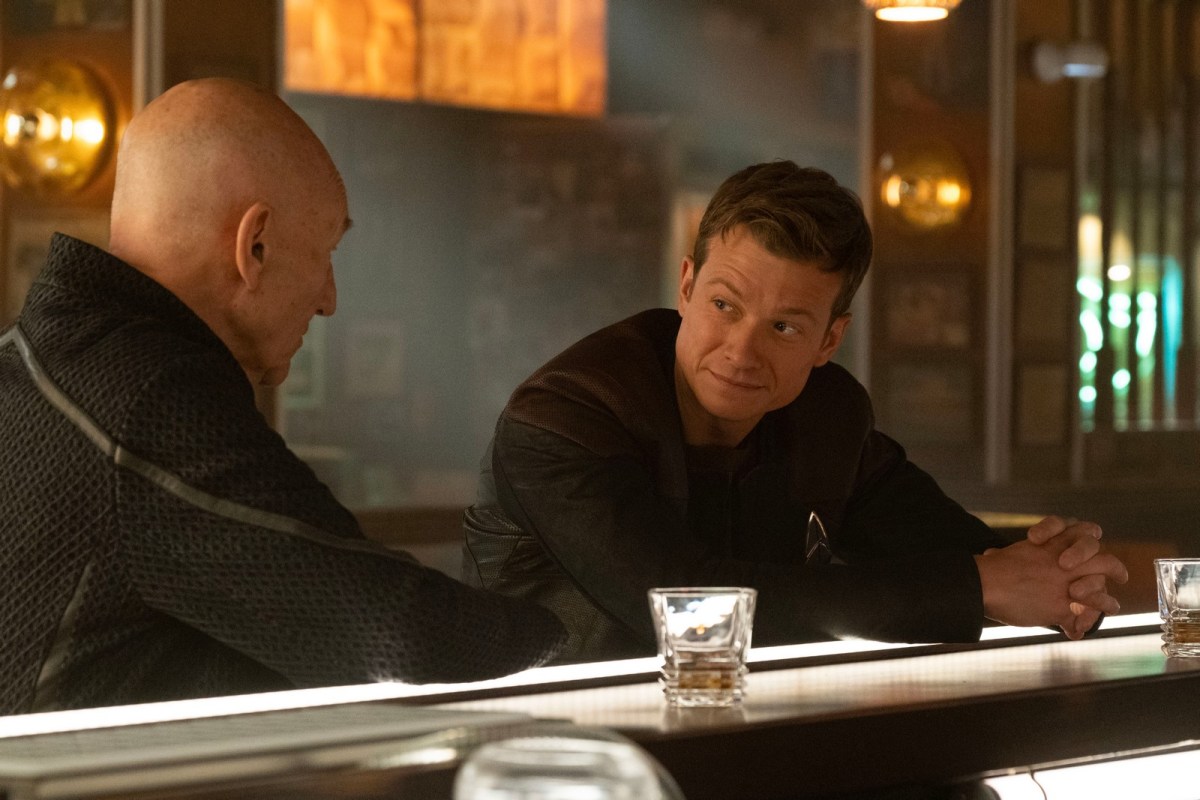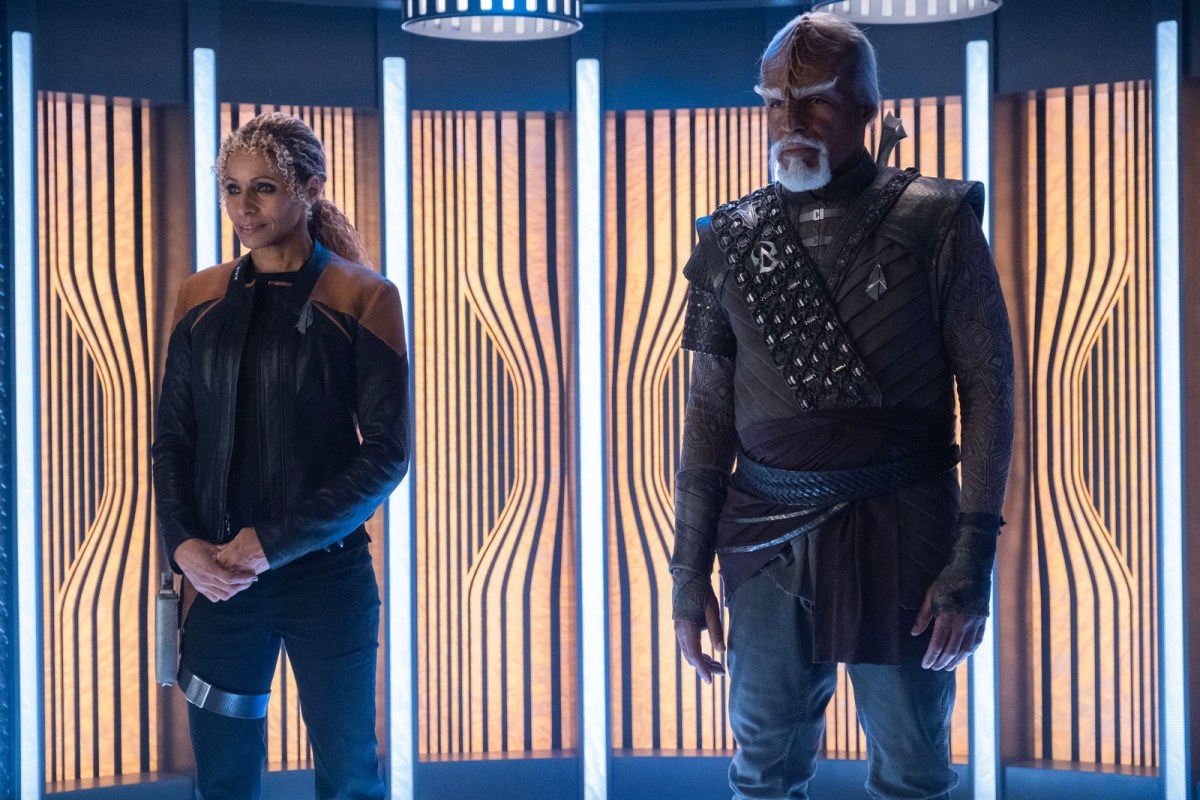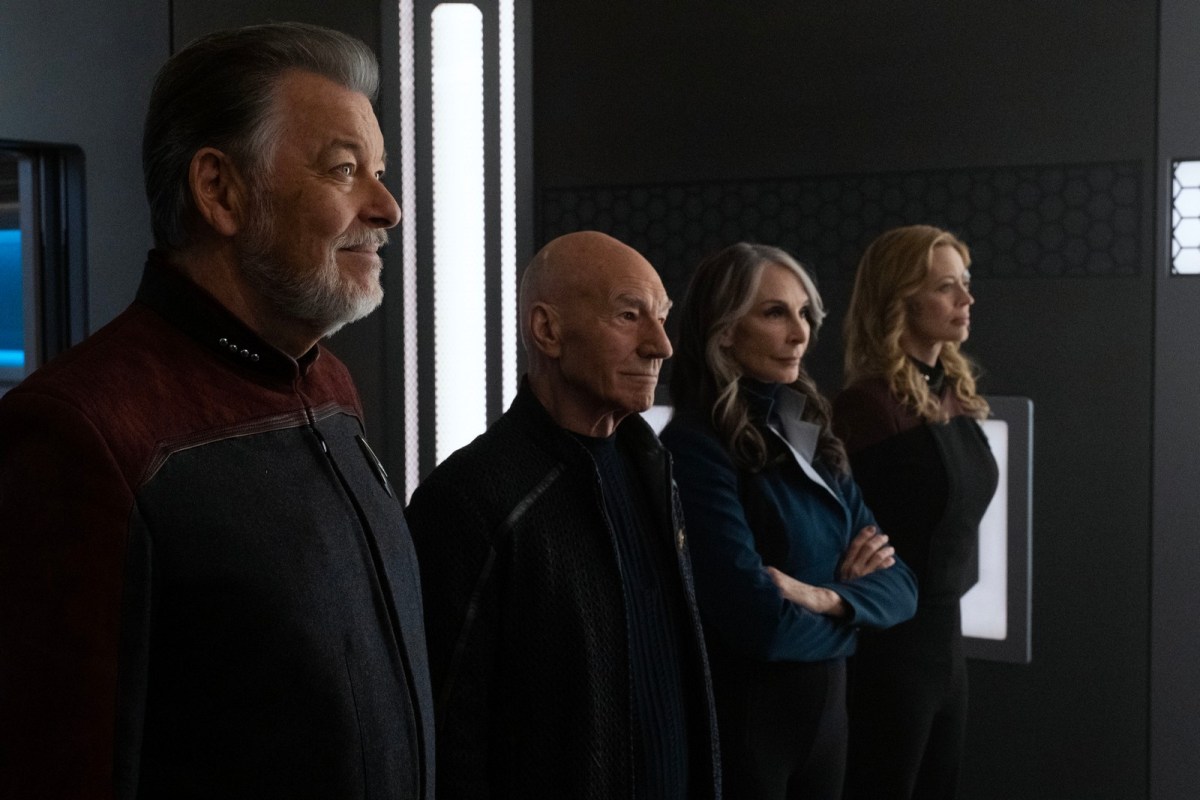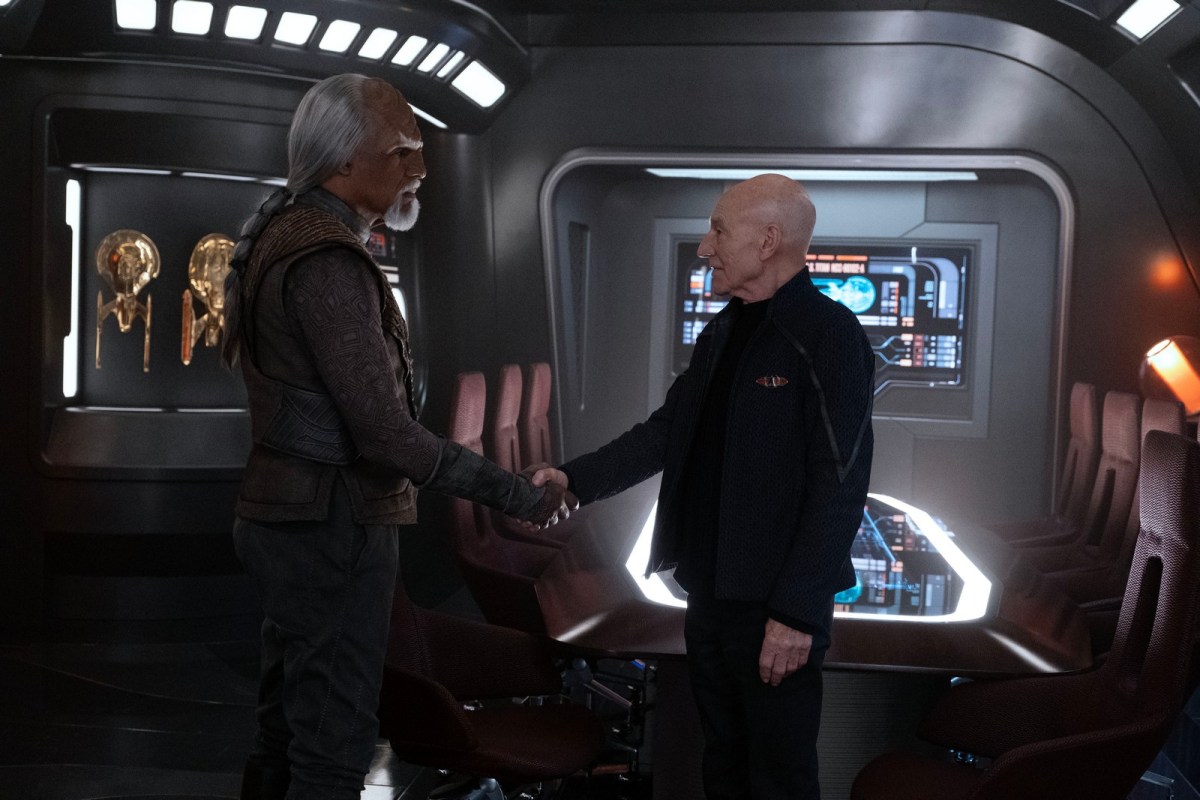This review and discussion contains spoilers for Star Trek: Picard season 3, episode 6, “The Bounty.”
“The Bounty” is everything frustrating about the third season of Star Trek: Picard in a 52-minute nutshell.
As demonstrated by the Changeling infiltration plot in “Imposters,” it is often difficult to discern what the third season of Picard is actually about. What is it saying? What is its point? It is a collection of familiar iconography thrown together in the hopes of stimulating fandom’s nostalgia receptors, but there must be more to this 10-episode revival of The Next Generation than just a delivery mechanism for fan service methadone. It can’t just be nine-ish hours of vacuous content, can it?
“Imposters” suggested whatever themes were running through the third season of Picard were just strange echoes of the previous two seasons. The Changeling plot is a retread of the paranoid Zhat Vash infiltration of Starfleet in the first season but without any of the larger subtext about refugees and immigration that anchored that story. Instead, it’s just a straightforward literalization of nonsense conspiracy theories about secret cabals controlling the world from the shadows.
“The Bounty” suggests the return to another theme that ran through the first season of Picard: the idea that Jean-Luc Picard (Patrick Stewart) and his contemporaries had ultimately failed the generation that followed them. The Next Generation promised the children who grew up on it a bright, prosperous, and utopian future, that the relative peace and stability of the 1990s would continue indefinitely. That ideal future never materialized. It was ultimately an empty promise.

The first season of Picard clumsily grappled with this reality. Picard was surrounded by children failed by their guardians: Elnor (Evan Evagora), a refugee that Picard swore to protect; Raffi Musiker (Michelle Hurd), the loyal attaché whom Picard abandoned when things got tough; Seven of Nine (Jeri Ryan) and Hugh (Jonathan Del Arco), Borg liberated from the Collective but given no purpose; Soji (Isa Briones), the android daughter of Picard’s surrogate son, Data (Brent Spiner).
As with every conversation about the first two seasons of Picard, it is important to acknowledge that it was a deeply flawed show. It existed in the uncanny valley between trashy and prestige television; it relied on momentum to disguise serious structural issues; it never seemed to understand how to use the elements it had in play. However, those flaws are also present in the third season of Picard, but without any underlying ideas beyond a desperate desire to pander to fandom’s nostalgia.
The first two seasons at least committed to this theme of generational strife by foregrounding these younger characters, by giving them some measure of agency and focus within the plot, and understanding that Picard’s journey was as much about them as it was about him. Agnes Jurati (Alison Pill) and Chris Rios’ (Santiago Cabrera) arcs might not have made any real sense, but they were at least character arcs anchored in these characters and performers as individuals deserving space in the narrative.
The third season of Star Trek: Picard gestures clumsily at this idea of generational tension. After all, Picard’s big character arc over the season involves his discovery that he has a son, Jack Crusher (Ed Speleers). In “Imposters,” Picard was confronted by Ro Laren (Michelle Forbes), a young officer whom he treated as a surrogate daughter and who betrayed his trust in her. In “The Bounty,” Sidney “Crash” La Forge (Ashlei Sharpe Chestnut) gets to stand up to her own father, Geordi La Forge (LeVar Burton).

On paper, that’s not so different from the theme of generational conflict that played through the previous two seasons of Picard. In reality, it is just shadow puppetry. There is no depth or complexity to it. There’s no meaning to be discerned from it. There is no point to it. Like the arguments between Jean-Luc Picard and William T. Riker (Jonathan Frakes) or Beverly Crusher (Gates McFadden) in “Seventeen Seconds,” it is just melodrama to pad out the runtime, a simulacrum of storytelling.
After all, neither Jack nor Sidney exists as an actual character. Picard has heavily hinted that Jack is some sort of sleeper agent, and the show is surely building to a big plot revelation around him. Even Vadic’s (Amanda Plummer) pursuit of him is framed as something less about Jack and more about his father. “That’s no bounty hunter ship,” Beverly explained in “Seventeen Seconds.” “That’s a war ship, with Jean Luc Picard-sized enemies behind it.”
Similarly, Sidney has appeared in most of the third season. However, the audience knows next to nothing about her. Almost every appearance has been about reminding the viewer that she is the daughter of Geordi La Forge. She even says as much in “No Win Scenario.” Literally the only thing that the audience knows about Sidney outside of her father’s identity is that she refers to Seven of Nine as “Commander Seven,” and that was a plot point that revealed the Changeling in “No Win Scenario.”
As such, these conflicts between parents and children ring hollow. The third season of Picard isn’t actually interested in the children as anything more than props. These are abstractions, not people. “I’m not Alandra,” Sidney tells Geordi. “I’m not an engineer like you. You built amazing things, but me? I just wanted to fly them. You took that as me rejecting you, but I always thought it brought us closer together. You would believe in this if you believed in me.”

It mirrors the conversation that Ro had with Picard in “Imposters,” particularly Picard’s assertion, “I believed in you.” Ro’s response neatly prefigured Sidney’s argument to her father, “Only when it was easy for you. If I meant so much, you would have understood.” However, there is a strong sense that Picard itself doesn’t believe in these characters. Even Ro is unceremoniously killed off at the end of “Imposters,” once she has vindicated Picard’s faith in her.
These children exist largely to absolve their parents of blame. In “The Bounty,” Jack’s trauma isn’t rooted in any choice that Picard made, but an accident of genetics. It’s not like Picard’s abandonment of Raffi or Elnor. It’s a fluke. “If only you were as good at passing on genetics as you are wisdom,” Jack observes. Still, Picard feels guilty. “The Bounty” ends with Jack absolving him of guilt, “Maybe you didn’t just give me some bullshit disease. Maybe you gave me some of the good bits as well.”
There is a sense that this is about unburdening Picard. “I’ve recently been reminded that we are not in control of what we pass on: strengths, wisdom, talent,” he confesses to Geordi. “And also flaws: weaknesses, sins of our past.” Much like Beverly’s decision to conceal Jack’s existence from him, this argument frees Picard from the weight and consequences of any of his own choices. Even Geordi’s conflict with Sidney is resolved when she reminds him of the virtues that he instilled in her.
It’s the same warped nostalgia that informs other recent revivals like Ghostbusters: Afterlife or Star Wars: The Rise of Skywalker — stories about how the older generation bears no responsibility for the flawed world that their children have inherited. It is just bad storytelling, because it means that none of the characters have any agency or need for growth. The younger generation are just props, and the older generation are perfect as they are. There is no story to tell here, but Picard tells this non-story very insistently.

At moments, “The Bounty” comes close to understanding this contradiction. It’s baked into the log entry from Altan Soong (also Spiner) that Riker plays on Daystrom Station. “Before I gifted Picard my golem, my intention was to live beyond my years — to become my own legacy,” Alton boasts. “Now I see, in my final days, that wasn’t just poor humanity; it was poor science, because evolution is not an act of preservation. It’s addition.”
This is an ironic argument from a show that wrote out all but one of its new characters to make room for a full-scale nostalgic revival of a series that ended almost three decades earlier. It’s particularly pointed in an episode that takes place in two separate museums to franchise continuity, packed with in-jokes and references. The third season of Picard has never really felt like it is about addition, but instead about cataloging and itemizing.
Riker leads a team to Daystrom Station, packed with continuity details like the raven from “Birthright, Part I” and the Moriarty Hologram (Daniel Davis) from “Elementary, Dear Data.” There are tribbles from “The Trouble with Tribbles,” a replica of the Genesis Device from Star Trek II: The Wrath of Khan, and even the dead body of James Tiberius Kirk (William Shatner) from Star Trek: Generations. Indeed, it’s revealed that Vadic’s true crime is grave robbery, having stolen Jean-Luc Picard’s organic body.

Meanwhile, the Titan visits “the Fleet Museum.” This is the “final resting place” of “every legendary starship,” itself built around the remains of “the old Spacedock” from Star Trek: The Motion Picture. They’re even displayed like models on a fan’s shelf. Seven quizzes Jack on some of the greats: the Enterprise from Star Trek V: The Final Frontier, the Defiant from Star Trek: Deep Space Nine, the eponymous ship from Star Trek: Voyager, the Bounty from Star Trek IV: The Voyage Home.
None of this is about addition. It’s just about showing off the collectibles. In many cases these are copies of copies, not the original: It’s Kirk’s second Enterprise, it’s the Sao Paulo recommissioned as the Defiant, it’s the New Jersey instead of the original Enterprise. Confronting Moriarty on Daystrom Station, Riker observes, “This is not the same self-aware Moriarty we encountered on the Enterprise.” So, what is the point of this? It’s not even the thing fans know. It’s just a facsimile.
Even the nods towards the future in “The Bounty” are not actually additions. Bringing Soong’s new android body online (also Spiner), it cycles through a range of personalities: Data, Lore, B-4. This is just an acting exercise for Brent Spiner, no different from what he did in episodes like “Brothers” or “Masks.” Every plan in “The Bounty,” from Vadic’s theft of the body of Picard to Jack’s hijacking of the Bounty’s cloaking device, is just an act of exhumation, resurrecting the past and parading its body.
Picard clearly still believes in The Next Generation. If only it felt the same way about the next generation.
